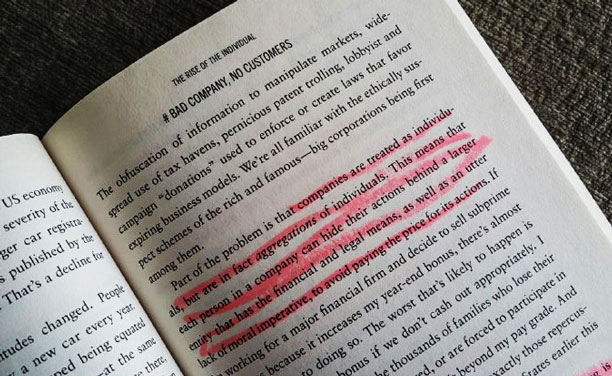Book Title: You Are The Product
Written by: Joshua Klein
Chapter Title: The rise of the individual
This rejection of established socio-commercial systems, like the idea that everyone needs to own their own car, is expanding.
People are owning less “stuff” and investing in experiences, instead.
Companies are treated as individuals, but are in fact aggregations of individuals.
This means that each person in a company can hide their actions behind a larger entity that has the financial and legal means, as well as an utter lack of moral imperative, to avoid paying the price for its actions.
Similarly, means of profit that used to be “normal” to organizations are becoming unacceptable to customers who are recognizing that the fees are no longer relevant.
Like banks that require five to seven days to change a single value in one database entry (bank account).
A recent study indicated that 40 percent of social networking accounts are spam – most of which are from bots being used to push products… Platforms line VirtuOz are launching automated chat agents on platforms such as Facebook and Twitter where they act like people who are in support of specific brands [VirtuOz was acquired by Nuance in 2013]
As individuals come to value intangibles – like trust, reputation, and relationships – that organizations cannot give them due to those values’ innately personal nature, those same companies are starting to resort to dirty tricks to continue to grow.
The result? A disconnect between individuals and the organizations.
Even Facebook, which pioneered so many of our now-standard social software norms, tends to be less legislative than older tech companies (like Microsoft, for example), who benefit more greatly from licensing fees than from third parties adding to their platforms and building their audience.
Again, it’s a different business model.
In the case of reputation, being transparent and available for collaboration or building on top of is a feature.
in case of “ownership” in the old sense of the word, that’s often a path to loss of profit.
In 2012, the Edelman Trust Barometer showed for the first time that trust and transparency are more important to corporate success than a company’s assets.







